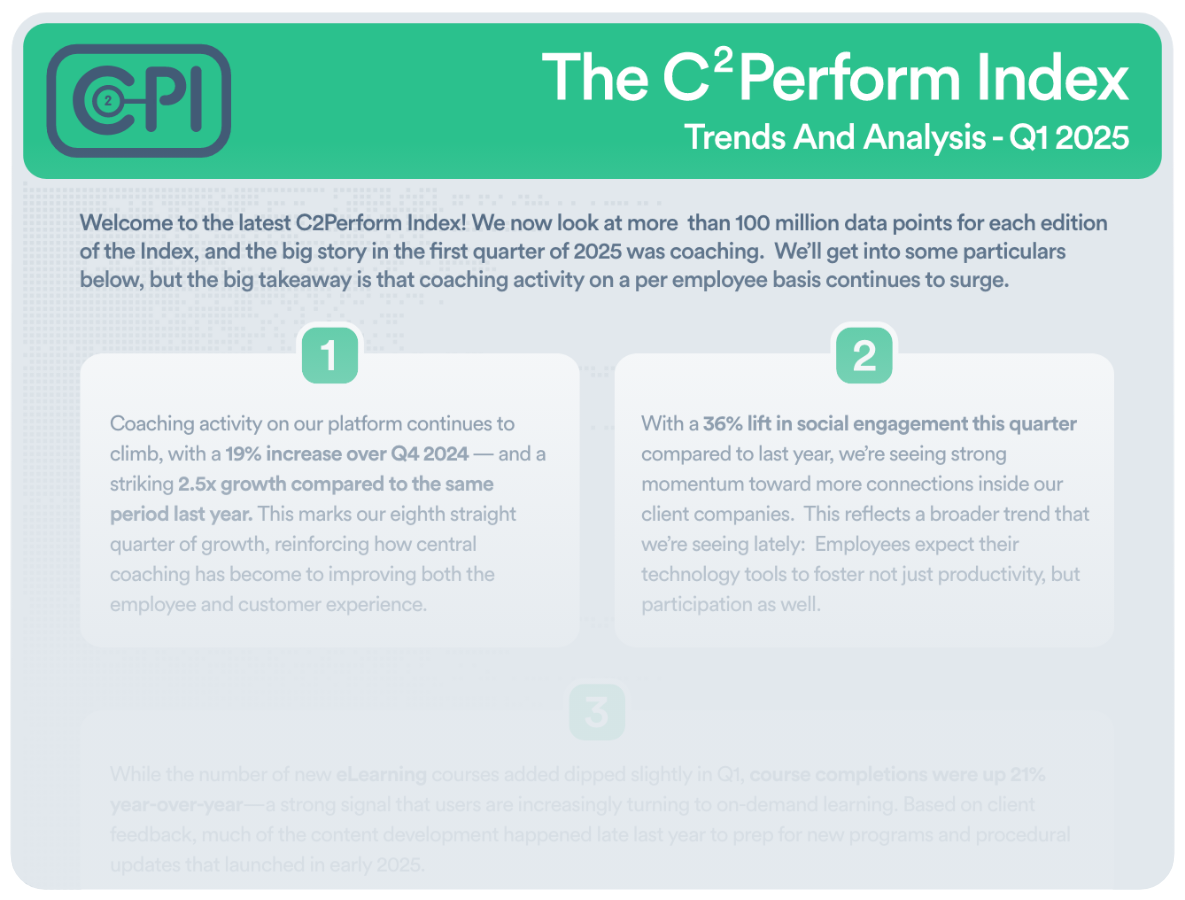In any organization, employee retention is key to success. For contact centers, this rings especially true as turnover is expensive and a drag on operational goals. Estimates on the cost of replacing an employee range from several thousand dollars to two times the employee's annual salary.
According to Gallup, turnover costs businesses $1 trillion every year.
The process of sourcing, hiring, onboarding, and getting new contact center agents up to speed requires a big investment of time and resources. This is for good reason—contact center agents are the backbone of success, many times acting as the front line in your company's Customer Experience - providing support, closing sales, solving technical issues - so they need all the knowledge and skills they can get to succeed.
To find and keep your best contact center agents, you need the right tools and management practices in place. Before getting into the tips for improving employee retention, it’s important to know why so many contact center agents leave every year.
Top Reasons for Contact Center Agent Turnover
In the world of contact centers, managers face a slew of obstacles on a daily basis, and one of their biggest pain points is dealing with employee turnover. In fact, 33 percent of contact center leaders say high turnover for agents is their biggest pain point.
This is not surprising when you consider the impact an understaffed contact center has on customer support operations. The best way to address this obstacle is learning more about the reasons for significant employee turnover at contact centers.
They Feel Undervalued
Contact center agents often feel undervalued, leading to frustration and disillusionment with their job. This is often tied to a lack of employee recognition or career development opportunities that enable them to earn higher salaries and advance in an organization.
When managing contact center agents, leaders might not always go out of their way to celebrate top performers and provide praise for a job well done. This can fuel feelings of frustration and resentment as employees begin to believe that their work isn’t appreciated or doesn’t matter to leadership.
Managers Are Not Leading Well
Many contact centers face high turnover due to poor team management practices. Potential examples include things such as micromanagement, unwillingness or inability to coach, and creating a toxic work environment rife with favoritism and/or double standards.
There are several ways managers can develop a positive culture for their agents. However, when culture is treated as an afterthought or a nice-to-have (not an essential component), agents may feel disconnected from their daily responsibilities.
Worse yet, they will lose trust in leadership and get the sense that they're only there to "punch a clock." Whether the team is feeling micromanaged or lacking the tools and skills they need to succeed, they will feel disengaged at work.
For the first time since 2009, employee engagement rates have dropped—as of 2022, just 34 percent of employees in the U.S. say they feel engaged at work. Failing to drive employee engagement is a surefire way to create a mass exodus of contact center employees.
They Lack Career Advancement Opportunities
Many contact center agents leave because they feel that they lack opportunities for professional growth within the company. This may be the case when managers fail to address performance and provide lateral or upward mobility within the organization.
Simply put, contact center agents want to know how they're doing. They want feedback and constructive criticism with the goal of improving their performance and, in turn, moving up through the organization. Without a clear path, agents may feel stuck without an action plan for achieving long-term career goals.
“Where do you see yourself in five years?” This isn’t just an interview question—it’s something that employees will ask themselves continuously as they work for you. (Plus, it's probably not even five years anymore.) If they don’t like the answer, they will seek new opportunities elsewhere.
Their Work-Life Balance Is Not Healthy
Working as an agent in a contact center can be highly stressful, with long hours and intense pressure to meet sales or service targets. Data drives everything in effective call center operations, but when agents consistently miss key performance indicators (KPIs), that can create significant stress—especially if they’re facing performance reviews or pay raises tied to those KPIs. And that's before factoring in the challenges of working remotely and juggling personal commitments with job requirements.
Ineffective managers often fail to help their teams find the work-life balance they need. Unfortunately, many agents will suffer in silence until it's too late and they decide to leave their role. If the line of communication is open between staff and leadership, they should feel comfortable to speak up and provide potential solutions, like flexible scheduling and development opportunities.
Learning how to keep employees can be daunting. There is no set-it-and-forget-it solution, but the good news is there are several tips to help you address these common issues.
5 Tips to Improve Employee Retention in Call Centers
Our work with clients in 25 countries has revealed a lot of best practices to improve retention. We thought we'd share some of the tips we've observed for improving employee retention in contact centers so you can empower your agents to stay and grow with your company.
Keep Lines of Communication Open and Consistent
One effective strategy for improving employee retention in call centers is to keep internal lines of communication open and consistent. This can be achieved by communicating regularly with your agents and providing timely feedback on their performance.
For example, managers may set up regular one-on-one meetings with employees to discuss their progress and provide constructive feedback on specific focus areas, like improving resolution rates or decreasing time to resolution on their support tickets. It’s also important to provide actionable strategies for achieving these goals—simply telling a call center agent to “do better on X” isn’t enough.
Also, open the channel for them to provide feedback to you. Give them a voice so they can express their perspective on management and leadership. This can be done via anonymous surveys or during quarterly review periods.
Staying consistent and open with your agents will help them feel valued, showing them that they are a meaningful part of the team.
Develop and Promote Clear Career Advancement Paths
Many employees at call centers are not looking to stay at the same level indefinitely. Developing and promoting clear career advancement paths can be an effective way to retain highly-motivated top performers. Doing so shows you care about your employees and that you're willing to invest in their career success.
Develop clear career advancement opportunities so that agents know exactly what they need to do to progress. There are several ways you can equip them with the knowledge and soft skills they need to advance, including:
Leverage the Right Tools for Improving Call Center Agent Performance
Seek out new strategies for improving agent performance outside of what you typically are offering. For example, you can look at gamification tools that enhance employee engagement which allow you to set up fun competitions in your department.
Technology is a key part of scaling successful contact center operations. You can leverage talent management solutions to gather insightful data analytics related to performance and develop targeted solutions. This will help you stay ahead of issues that could lead to high turnover and better equip your agents to meet their KPIs.
Be Proactive in Addressing Work Stress to Prevent Burnout
A staggering 74 percent of contact center agents are at risk of burnout, which obviously can lead to employee turnover. However, the impact has a ripple effect, fostering a negative workplace culture and hurting your customer experience as well.
Focus on creating a healthy work-life balance for your agents. There are severals ways you can support them in this, such as the following:
- Be intentional about staying in touch, especially with remote or hybrid team members.
- Offer flexible scheduling options if possible so agents can better manage their time and take care of personal commitments.
- Have a feedback loop so employee input is recognized and acted upon. If an agent raises an issue, own it, work it and provide feedback or resolution.
- Perhaps the fastest growing trend we see is companies providing access to mental health resources and support, such as counseling or stress management training programs. These resources can be a great help for employees who struggle to manage their workload in a healthy way.
- Set clear expectations for call center agents and prioritize work based on customer impact so that agents feel more satisfied with the outcomes of their efforts.
Cultivate a Positive, Collaborative Culture
Managers need to stay committed to team building and creating an environment that fosters strong collaboration between agents. Some key strategies for building these relationships include:
- Creating regular opportunities for team bonding, whether they're in person or virtual. (Just search "virtual icebreakers for work" on Google and you'll see a ton of ideas.)
- Centralizing internal documentation using a knowledge base so that employees can share insights they learn with documented operations and procedures.
- Creating an employee recognition program that encourages peer shout outs and includes fun gifts and incentives.
When you encourage collaboration and enable team members to connect with one another, you will see a positive impact on morale, engagement, and retention.
Need Help Coaching and Communicating with Employees?
The ultimate question that plagues most managers is this: How do you keep employees around? This is especially challenging in the high stress, high turnover environment of contact centers.
But as we covered, you have plenty of best practices you can follow. Remember to develop and promote clear career advancement paths, leverage the right tools to support agent performance and provide proactive support for work-related stress and burnout. Additionally, creating a positive and collaborative team culture can help to foster better relationships between team members, which will have a positive impact on morale and retention.
If you need help managing your contact center employees or communicating with them effectively, you can use technology solutions like C²Perform. Our suite of performance management and employee engagement applications give contact center management teams everything they need to support and engage their teams.
Schedule a free demo of our platform to see how to enhance your employee retention efforts and keep your agents happy so they can continue to delight your customers.
 English
English Español
Español









